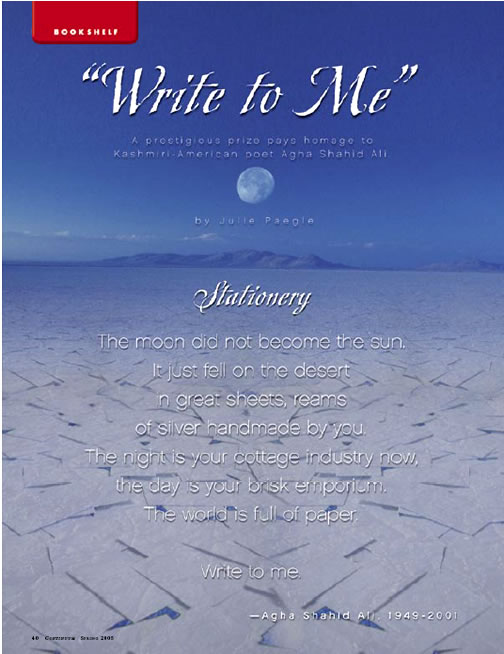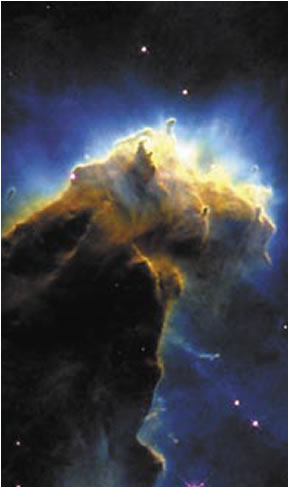
Vol. 14 No. 4 |
Spring 2005 |

To his students Ali was a brilliant, energetic, and occasionally irreverent teacher. To his colleagues and fellow poets, he was an inspired artist and generous spirit.
Ali is especially remembered and revered for his enrichment of contemporary English-language poetry with non-Western traditions, particularly the ancient verse form the ghazal. He encouraged many American poets to write and contribute ghazals to an anthology he edited, Ravishing DisUnities: Real Ghazals in English. His own posthumous collection of ghazals, Call Me Ishmael Tonight, not only demonstrates his mastery of this demanding form—“composed of autonomous or semi-autonomous couplets united by a strict scheme of rhyme, refrain, and line-length” (his description)—but also pays tribute to many of the contemporary poets he admired.
Born in New Delhi and reared primarily in Srinigar, Ali considered himself Kashmiri American. He was uniquely positioned to combine the poetic tradi- tions of east and west, and to inflect his English poetry with the music of his native Urdu. In Ali’s poetry, the personal and the political, the immediate and the historical, are inextricably woven through his use of imagery, forms, and powerful emotion.
“Snowmen,” for example, recognizes the inescapable influences of history and ancestry. The poet writes of an heirloom “passed from son to grandson / generations of snowmen on my back.” The poem also celebrates the power latent in such ancestry, and the possibility of transforming the cycles of the past: “I’ve promised myself, / even if I’m the last snowman, / that I’ll ride into spring / on their melting shoulders.”
“Stationery” plays with the familiar notion of moonlight as the stuff of poetry. But for Ali, the moon is not merely the subject of the piece; rather, in a delightful reversal the moonlight literally becomes poetic material—the paper itself. “The world is full of paper,” he indites, urging, “Write to me.” This closing line, with its open invitation to verse, is particularly emblematic of Ali, at once an avid reader of poetry and an inspiring poet.
The Agha Shahid Ali Prize in Poetry extends this spirit of poetic invitation that is so characteristic of Ali’s life and work. Thanks to the combined efforts of Katharine Coles PhD’90, professor of poetry and fiction for the Creative Writing Program in the Department of English, and graduate students Dawn Marano and Peter Covino, the prize—now in its third year—was inaugurated in early 2002. Co-sponsored by the University of Utah Press and the Department of English, the prize includes publication of a winning poetry manuscript, chosen by a distinguished judge; a $1,000 award; and an invitation to give a reading at the English Department’s Guest Writers Series.
 |
1949
- 2001 |

Ghazal
When through night’s veil they continue to seep,
stars
in infant galaxies begin to weep stars.
After the eclipse, there were no cheap stars
How can you be so cheap, stars?
How grateful I am you stay awake with me
till by dawn, like you, I’m ready to sleep, stars!
If God sows sunset embers in you, Shahid,
all night, because of you, the world will reap stars.
—Agha Shahid Ali,
from Call Me Ishmael Tonight
The Agha Shahid Ali Prize series is not the first offered by the University of Utah Press. For many years the press had a noteworthy poetry series that published, among other titles, Henry Taylor’s An Afternoon of Pocket Billiards (1975). Taylor went on to win the Pulitzer Prize in 1986. The press also published several titles, including Country of the Minotaur, by celebrated local poet Brewster Ghiselin. However, insufficient resources eventually led to the discontinuation of the series.
Coles felt that, given the national acclaim of the Creative Writing Program, the University of Utah had a responsibility to offer a poetry series. This, combined with the desire to keep Ali’s memory alive, led her to approach Marano, then acquisitions editor for the University of Utah Press, in 2002. Together, they developed a proposal and a budget for the logistical elements of the prize, which they presented to Editor-in-Chief Jeffrey Grathwohl. He agreed, suggesting that Coles act as series editor.
Coles also enlisted the talents of Covino, a doctoral candidate in poetry (see Continuum, Spring 2004), who had known Ali in New York and, in the fall of 2001, enrolled in Utah’s Creative Writing Program to study with him. But by this time, Ali was seriously ill and had returned to New York, where he was being treated for brain cancer. Covino remembers, “Even when Shahid was dying and it became apparent that he would not be able to return to Utah to fi nish the semester, he encouraged me to go to Utah without him. ‘Be abundant,’ he always told me; ‘That abundance will help you write even more important poems.’ ”
Covino—who is now a successful poet in his own right, with over 30 journal publications, one chapbook and a book forthcoming from New Issues Press—remembers Ali as a generous supporter of his early work, and the primary reason he decided to pursue poetry as a profession. “Shahid’s abundant spirit prevailed when he insisted that I take poetry more seriously and consider applying to the U of U program. Shahid single-handedly gave me the confidence to leave a secure profession, where I had been working for nine years, for all the insecurities of poetry and academia.”
Covino worked with Coles in planning Ali’s memorial service and was eager to participate in the launching of the memorial prize. “A lot of people love Shahid, and when Kate Coles, Karen Brennan, Jackie Osherow and I started to plan his memorial service, everyone agreed that we should also inaugurate a poetry prize in Shahid’s honor… it seemed to be the right thing to do to ensure that future students at the U think about who he is.” Covino assumed the role of coordinating the competition, tackling the formidable task of overseeing the preliminary reading of hundreds of manuscripts.
The first judge, poet Christopher Merrill, was selected, in part because of his close friendship with Ali (in fact, Ali dedicated his last collection to Merrill). In choosing from among the final manuscripts, Merrill carefully considered which collection Ali himself might have selected. The winning book, Persuasions of Fall, by poet Ann Lauinger, who teaches Renaissance and Medieval Literature at Sarah Lawrence College, shares with Ali’s work rigorous, witty, and deft use of forms. Lauinger’s relationship to literature richly influences her poetry, and she includes Beowulf, Chaucer, Hopkins, and Auden as sources of inspiration. While Lauinger has been published in prestigious journals such as The Missouri Review and was recognized with a 2002 Erskine J. Poetry Prize, Persuasions of Fall is her first book-length collection of poetry.
Although Lauinger did not know Ali personally, she says she feels honored to be linked to his name. “Since receiving what I think of as his prize, I’ve met a steady stream of people who knew him, studied with him, or were his colleagues. They all speak of him the same way: with love. He clearly had a gift for touching people, responding to them so they felt—deeply, uniquely—heard. His poems, which to me are marvels of finding form in chaos, seem also to be much about listening.” While Lauinger’s teaching load doesn’t leave her much time to focus on poetry, she continues to write when she can. She says winning the prize has enabled her to feel that she is beginning to join the company of the contemporary poets whom she reads and loves, and that such a step is an honor.
The judge for the 2004 prize was former national poet laureate Mark Strand, who taught at the U from 1986 to 1994. He selected Jacqueline Berger’s Things That Burn, due from the press in spring 2005. Berger’s first book, The Mythologies of Danger, won the 1998 Bluestem Award and also the 1998 Bay Area Reviewers Association Award. Her poetry has been published in numerous anthologies and journals, including American Poetry: The Next Generation, River Styx and others. Berger, who teaches at Notre Dame de Namure University and at City College of San Francisco, sees her writing and teaching as symbiotic. “I really adore teaching, and it certainly inspires me. And I couldn’t teach writing if I didn’t write. So the two certainly work together.”
Berger says winning the prize was very significant for her. “Knowing Mark Strand was this year’s judge meant so much to me. To have such an important and wonderful poet not only read my work but select it is a tremendous honor.” Of Things That Burn, Berger states, “I want to use both story and language to enter the place where experience is atmospheric—the blue or red smoke of the soul, if you will.”
In its first two years, the press has published first and second books from two very talented and different poets, writing and teaching on opposite coasts. As the series continues, Coles expects that it will involve an increasingly varied group of judges. She comments: “The prize will continue to involve diverse judges, who will select an equally diverse group of prize winners—and I think Shahid would appreciate this diversity.”
As suggested by the contest coordinator for the 2004 prize, doctoral candidate Nicole Walker MFA’02, “The process of reading for the prize really crystallized its uniqueness. Of the hundreds of entries we’ve received over the last two years, many included handwritten notes about Shahid and his poetry, their meaning and influence. The contest feels suffused with his spirit.” Coles agrees: “The remarkable thing about the prize is how many of the people involved with making it a success have contributed their time and talents out of their love for Shahid and their wish to preserve his memory.”
—Julie Paegle BS’96 BA’97 MFA’01 is in her
fifth year of a doctoral program in poetry/creative writing.